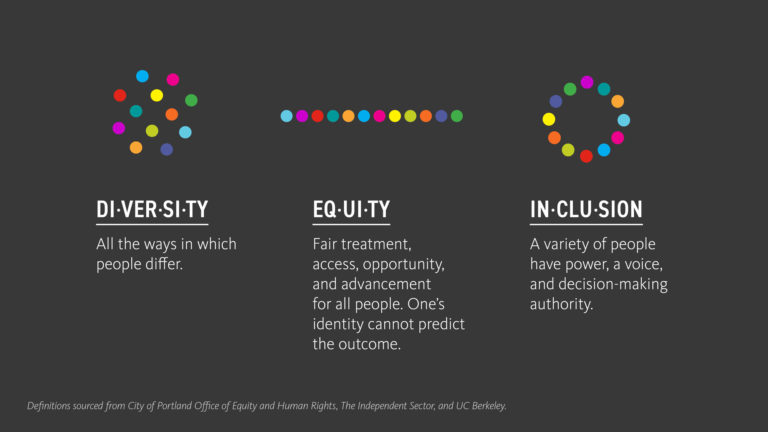Workplace Productivity: Diversity and Inclusion Mandates and its Impact on Mental Health

Diversity and inclusion mandates play an important role in building workplace culture for employees. This in turn has essential impacts on the mental health of employees and in turn their work output. Debilitating mental health may often create negative impacts on employee productivity. D&I mandates that help employees feel safe and comfortable within their place of work creates
By its very definition, a poor state of mental health means that a person can’t cope with life’s normal stresses, or can work productively and fruitfully. In fact, according to WHO, five of the 10 leading causes of disability worldwide are mental health problems. Yet, despite mental health being an essential part of one’s overall health and mental illnesses being extremely common, mental health is often minimized, stigmatized, or overlooked altogether.
Diversity and Inclusion Mandates and it’s Impact on Mental Health
Mental health is a crucial part of diverse and inclusive workplace culture. In fact, diversity and inclusion (D&I) experiences in the workplace and employee mental health are closely linked, especially through the issue of ‘emotional tax’. Employees pay an ‘emotional tax’ at work whenever they are in an environment where they feel different than their colleagues due to gender, race and/or ethnicity, which has an acutely negative impact on mental wellbeing, and productivity.
The perception of a workplace as non-inclusive also leads employees to actively hide aspects of their identity, which again becomes demoralising and taxing. In a 2013 research by Deloitte and NYU Professor, Kenji Yoshino, showed that out of the 75% of employees covering their identity in the workplace, between 60-67% of respondents stated that the practice of covering was “somewhat” to “extremely” detrimental to their sense of self. Contrary to this, as per a study of the Australian workplace by the non-profit Diversity Council Australia, workers who feel included are 10 times more likely to be effective, and 19 times more likely to be satisfied with their job, than workers in non-inclusive teams.
Mental health issues negatively affect employee performance and productivity, engagement with work, communication with coworkers, and daily functioning, having serious consequences not only for the individual but also for the enterprise’s productivity. For instance, WHO has estimated that India will suffer economic losses amounting to a staggering 1.03 trillion dollars from mental health conditions between 2012 and 2030.
Apart from loss of motivation and commitment, increase in error rates, burnout, and job-stress (stress that occurs when the job requirements don’t match the capabilities, resources, or needs of the worker), poor mental health can also lead to on-the-job injuries, tension and conflicts between colleagues, workplace violence, and higher rates of absenteeism . In fact, absenteeism (or an employee’s intentional or habitual absence from work) is a good representative-indicator of mental health in an organization.
“If you want to know the mental health of your employees, look at absenteeism rates”, says Dr. Soumitra Pathare, Director of Centre for Mental Health Law and Policy at the Indian Law Society’s Law College in Pune.
Since mental health is also linked to physical health, if you’re not mentally well, your physical health will be impacted, in turn impacting productivity. This is described as ‘presenteeism’, which means people are present but not actually performing as well, because of an unaddressed, hidden mental health problem. Hence, somebody who’s mentally unwell may come into work but won’t be productive at all because they just can’t bring themselves to work.
What Can Companies Do to ensure Productivity at Workplace?
Mental health conditions are covered under the Mental Healthcare Act, 2017, as well as under the disabilities listed in the Rights of Persons with Disabilities Act (RPWD), 2016. Neither can an employee be treated differently from others because of their disability nor can they be excluded and denied the support to become part of a process, organization, or public life in general. In fact, as per the RPWD Act and the rules framed thereunder, every establishment is now mandatorily required to have an ‘equal opportunity policy’ in place.
This means that employers must make reasonable accommodations for workers with such disorders to perform their responsibilities. Therefore, workplace policy must be updated for mental- health consideration to be built into the very fabric of the organization. The policy should include a clear understanding towards making reasonable adjustments and retaining staff who develop a mental health problem, ensuring that individuals suffering from mental health problems are treated fairly and consistently and aren’t made to feel guilty about their problems.
For a better understanding on creating an inclusive health policy that effectively takes mental health into account, and suits your organisational needs, you can check out the advisory services offered by Ungender. You can also host seminars or workshops at the company level that address depression, and teach stress management techniques (like mindfulness, breathing exercises, and meditation).
Peer counselling, where employees who have experienced mental and emotional health challenges and learned to manage them help co-workers who are facing similar issues, is another useful measure that can be tried. Employees are more likely to talk to somebody who they work with because they spend eight hours a day with them, and if the peer counsellors are trained, then it can be a resource within the company itself and people wouldn’t necessarily have to seek outside help. For example, in 2017, Johnson & Johnson created an employee resource group for mental health, which now has about 1,500 members who provide resources to educate and support colleagues coping with behavioral ailments. Many have been trained on how to spot signs of problems among their staff and to raise the subject with those who may be suffering.
What are Employee Resource Groups?
Employee resource groups are voluntary, employee-led groups that aim to build a diverse and inclusive workplace. These groups provide networks of support that make marginalised employees feel safe and comfortable. Moreover, ERGs are also important to align workplace activities to organisational culture. For employees, employee resource groups are a great way to build solidarities within the workplace. For marginalised employees, entering a new space of work may be daunting. The presence of solidarity networks in the form of employee resource groups are a great way to make them feel welcome and safe.
Organisations that depend on legal advisories for their diversity and inclusion mandates are automatically more aware of ways in which workplaces can become safer for employees. The awareness on building ERGs also comes from training and sensitization programs. Consequently, building of ERGs will help organisations increase awareness and sensitization to relevant topics like gender within their workplace.
Conclusion
Starting workplace conversations about behavioural health is challenging because such conditions are often seen as a personal failing rather than a medical condition. These aren’t easy conversations to have, but they’re nevertheless necessary. It is up to you to create and promote a culture where employees are able to talk openly about their job and mental health problems.
It is also important for workplaces to truly understand how programs can be made relevant for their specific culture. Advisories are able to curate training and sensitization sessions that help organisation traverse beyond legal mandates and build a sense of belonging for their employees. It’s important to acknowledge that workplace inclusivity helps organisation improve employee morale and productivity. Advisories that build customised diversity and inclusion plans are able to help organisations achieve the same.
Moreover, advisories also help organisations acknowledge the need for diversity within their organisations and consequently help them put policies and processes in place that foster workplace inclusivity. Workplace inclusivity is an integral way to raise awareness among decision makers as well as build solidarity among employees to boost employee morale. Advisories that place importance on these training programs while also focusing on policy implementation can help organisations build workplace inclusivity for a higher impact within as well as outside the organisation.
Ungender has been helping leaders build productive workplaces since 2013. Get in touch at contact@ungender.in.
Ungender Insights is the product of our learning from advisory work at Ungender. In our initiative to build inclusive workplaces for all individuals, we continue to educate and advise leaders on the same. Write to us at contact@ungender.in to know more about our advisory services.
Read our insights about diversity, legal updates and industry knowledge on workplace inclusion at Ungender Insights. Visit our Blog.
Sign up to stay up-to-date with our free e-mail newsletter.
The above insights are a product of our learning from our advisory work at Ungender. Our Team specialises in advising workplaces on gender centric laws.
or email us at contact@ungender.in




